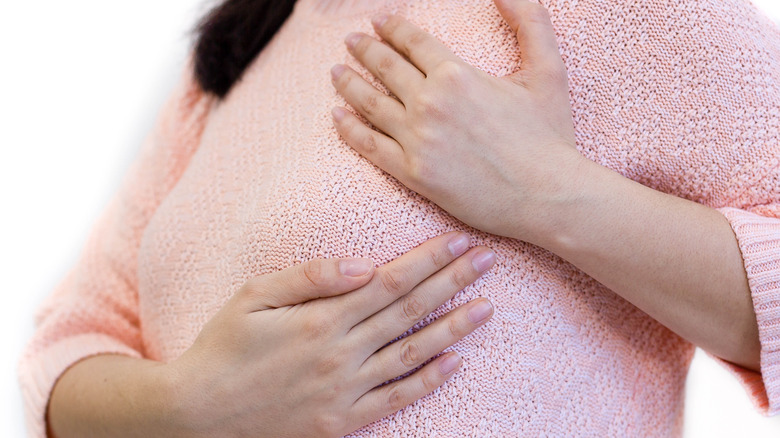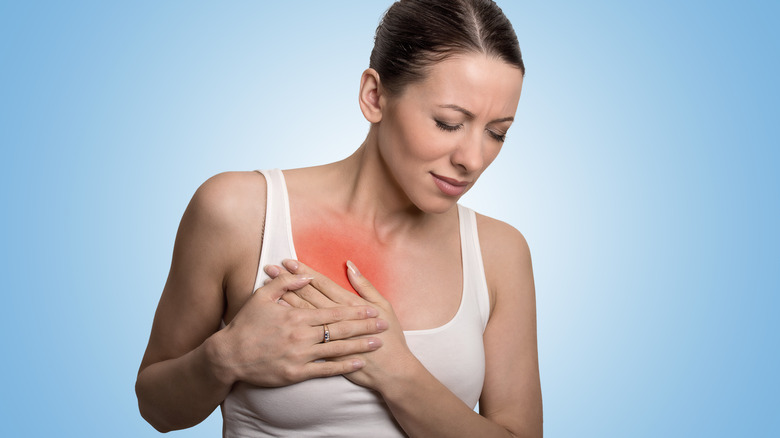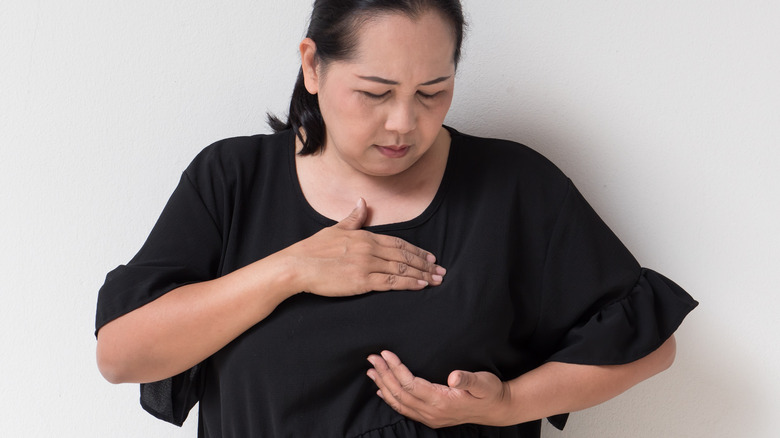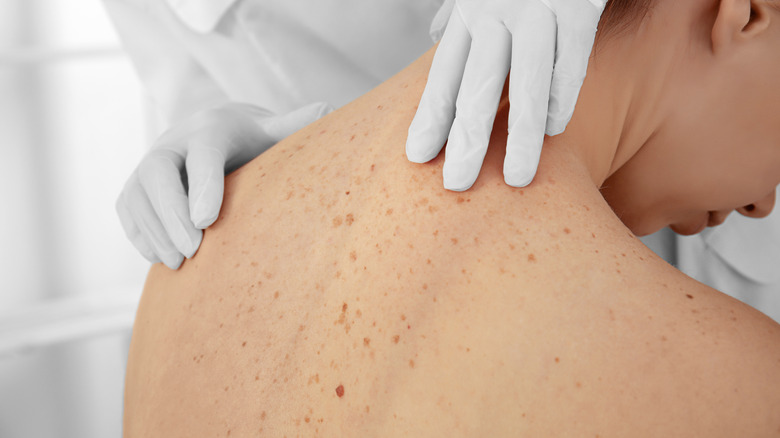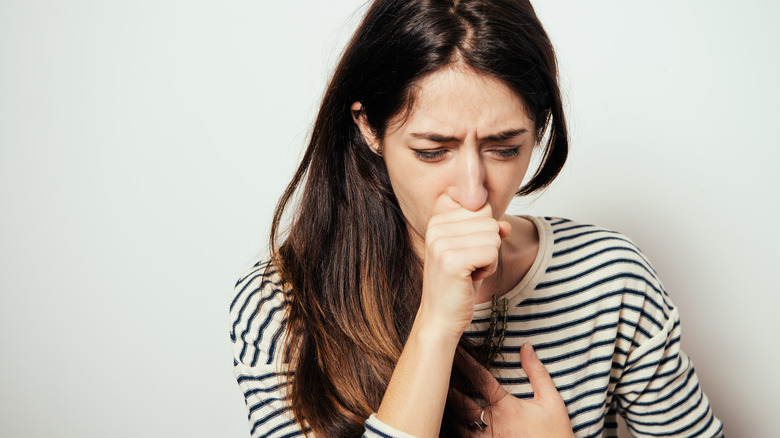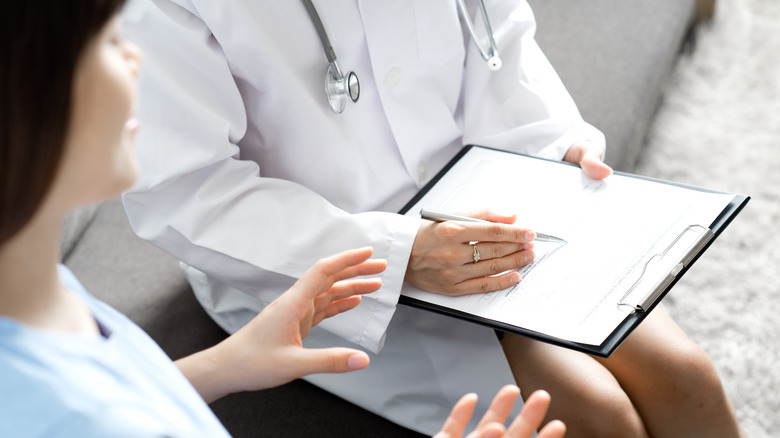Breast Cancer Symptoms Every Woman Needs To Know
According to breast cancer statistics at Breastcancer.org, about 12 percent of women in the United States (that's one in every eight women) will develop invasive breast cancer in their lifetime. According to those statistics, breast cancer is second only to skin cancer for the most commonly diagnosed cancer among women.
While these statistics sound grim, the good news is that both Stage 1 and Stage 2 breast cancers usually respond well to treatment. That means it's important to catch it early. And to do that, you need to know what to look for. These are the breast cancer symptoms that every woman needs to know.
A lump in your breast
While checking for a lump in the breast is probably the most well-known way to check for breast cancer — and research has shown that a large portion of breast cancer survivors found their own breast cancer either through a self exam or by accident — it may not always be clear what a woman should be checking for.
The team at Breastcancer.org suggests performing a breast self exam (BSE) once per month to get used to how your breasts normally feel. That way, if you feel something out of the ordinary, you're more likely to know. Another important thing to note is that "lump" can be a confusing way to describe what you're looking for. While this may make it seem like you're looking for something shaped like a marble, lumps in the breast can range from spherical shaped, to a general "thickening" of the breast tissue. That's why it's important to know what your breasts normally feel like so you can tell if anything suddenly feels off.
Pain or tenderness
Although lumps in the breast are often painless, experiencing pain or tenderness in your breast may be a red flag that something serious is going on. This is different from the pain and tenderness you may feel right before or during your period.
Pain is most commonly associated with breast cancer if there is a tumor that is pushing against healthy tissue or if you have the less common form of breast cancer known as inflammatory breast cancer. If your pain is new or suddenly different from something you've experienced before, talk to your doctor.
A flattening or indentation of the breast
We all know that breasts can seemingly deflate with age, however if you notice that one of your breasts seems suddenly flat or you see an indentation in your breast tissue, you should make an appointment with your doctor. This type of change in your breast tissue "may indicate a tumor that cannot be seen or felt."
Nipple changes or discharge
Like the rest of the breast, your nipples can change over time and that's totally normal. What may not be normal is if you notice sudden changes in your nipples such as pain, retraction (where the nipple turns inward), or discharge that isn't breastmilk. This is because breast cancer often begins in milk-producing ducts and so nipples may be affected more noticeably than other parts of the breast.
An important note on retraction: inverted nipples can be totally normal in some women. It should only be cause for concern if one of your nipples that is normally extended, suddenly inverts. Similarly, while nipple discharge may be related to something completely different and benign, if you have a lump in your breast and also experience some sort of discharge, especially discharge that happens on its own (spontaneously) and is either clear or bloody, you should talk to your doctor immediately.
There is also a rare form of breast cancer, known as Paget disease, that affects the nipples specifically, so take special note of any major changes to your nipples.
Contour, temperature, or texture changes
Changes in your breast, such as to the contour, temperature, or texture, can be a sign of a type of breast cancer known as inflammatory breast cancer. While the National Cancer Institute reports that this type of rare breast cancer accounts for just one to five percent of breast cancer cases, it is aggressive so if you're noticing its symptoms, it's especially important to see your doctor.
Your breast may appear red and inflamed (and warmer than normal to the touch) or may even look dimpled or pitted, like the skin of an orange. The National Cancer Institute says this type of breast cancer is more common in women who are overweight or obese and is more likely to occur in young women.
You have many moles
While having moles isn't exactly a symptom of breast cancer, women who have more moles may be more likely to develop breast cancer, according to two recent studies.
Women in the study were classified as having: no moles; a few moles; many moles; or very many moles. Over the course of the study, researchers concluded that those with "very many moles" had a 13 percent greater chance of developing breast cancer. While the result is still inconclusive when controlling for other factors, this is yet another reason to not only perform regular breast self exams, but also regularly see a dermatologist.
Changes in bowel movements
If you're finding yourself suddenly constipated, be sure to take note of any other symptoms. A study back in the '80s found an association between women who are constipated and an increased risk of breast cancer. Then, a study in 2008 found that women who had three or more bowel movements per day (classified as frequent bowel movements in the study) had a 46 percent decreased risk of developing breast cancer compared to women who had only one bowel movement per day.
While there hasn't been much conclusive research since then to determine if constipation was a symptom of breast cancer or if something else in the body is related to both frequent constipation and breast cancer, if you're noticing changes in how often you go to the bathroom, talk to your doctor.
Cough or hoarseness that doesn't go away
Some symptoms of breast cancer may indicate that the disease has progressed. These may be symptoms of any form of cancer, but because breast cancer is so common among women, and may go undiagnosed for quite some time, they're important to mention.
One sign that something may be going on is if you have a persistent cough or hoarseness that doesn't go away. This could mean that breast cancer has spread to your lungs, which Breastcancer.org notes is one of the most common places for breast cancer to spread.
Unexplained weight gain or loss
According to the American Cancer Society, a sudden and unexplained loss of ten or more pounds is often an early sign of many forms of cancer. If, however, you notice that you're gaining weight or that your breasts seem swollen, large, or heavy, this can also be a sign of cancer.
While your unexplained weight gain or loss may not be cancer-related, if you can't pinpoint why you're gaining or losing weight, even after tracking your eating habits and physical activity, talk to your doctor.
Rule out other causes
Nothing is scarier than a potential cancer diagnosis. The possible symptoms outlined here are especially terrifying given that they can all be symptoms of something else entirely (and that something could be totally benign). This process of determining whether your symptoms might be related to something else is called "differential diagnosis" and for breast cancer symptoms these can include a benign breast disease such as cysts, or eczema or another rash, among many other things.
While you should absolutely talk to your doctor if you're having concerning symptoms, remember that as we get older our bodies naturally change and start doing different things. Perform your monthly breast self exams and keep track of them in a journal. Note any odd things you find, or other symptoms you're having, and talk to your doctor if you notice something truly out of the ordinary.
The only real way to know whether what you're experiencing is breast cancer is to see your doctor. While you are your own best advocate for getting the care you need, and for noticing changes in your body, you can't diagnose breast cancer alone. Seek out professional expertise to determine what's going on with your body and what your next steps may be.
Find support if you're diagnosed
While not a symptom of breast cancer, feelings of fear and loneliness may occur after being diagnosed. And there are countless resources online for finding a support group of other people who have been diagnosed with breast cancer. Find one of those support groups and connect with people who understand what you're going through.
There are even some therapists who specialize in treating those who have been diagnosed with cancer and other diseases. Remember, while breast cancer (like any cancer) is scary, there are viable treatments available...and you don't have to fight it alone.

